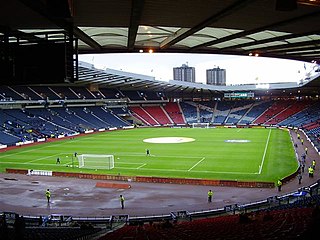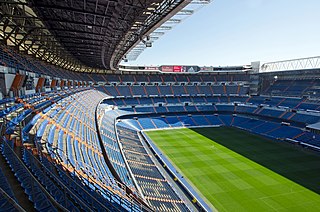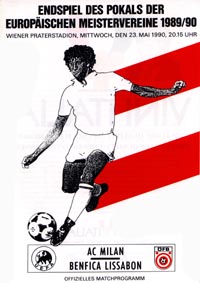
The Ernst-Happel-Stadion(Ernst-Happel-Stadion ), known as Praterstadion until 1992, sometimes also called Wiener-Stadion, is a football stadium in Leopoldstadt, the 2nd district of Austria's capital Vienna. With 50,865 seats, it is the largest stadium in Austria. It was built between 1929 and 1931 for the second Workers' Olympiad to the design of German architect Otto Ernst Schweizer. The stadium was renamed in honour of Austrian footballer Ernst Happel following his death in 1992. The stadium hosted seven games in UEFA Euro 2008, including the final which saw Spain triumph over Germany.

Ernst Franz Hermann Happel was an Austrian football player and manager.

The 1958–59 European Cup was the fourth season of the European Cup, Europe's premier club football tournament. The competition was won by Real Madrid for the fourth time in a row, who beat Reims 2–0 in the final at Neckarstadion, Stuttgart, on 3 June 1959. The two finalists also competed in the final of the first European Cup in 1956.

The 1959–60 European Cup was the fifth season of the European Cup, Europe's premier club football tournament. The competition was won by Real Madrid, who beat Eintracht Frankfurt 7–3 in the final at Hampden Park, Glasgow. It remains the record score for the European Cup final. It was Real Madrid's fifth consecutive European Cup title. It was also the first time that a German team, Eintracht Frankfurt, reached the final.

The 1960–61 European Cup was the sixth season of the European Cup, UEFA's premier club football tournament. The competition was won by Benfica, who won 3–2 in the final against Barcelona, who had knocked out Spanish rivals Real Madrid, winners of the first five tournaments, in the first round. Benfica was the first Portuguese team to reach the final and to win the tournament. For the first time a Norwegian club participated.

The 1963–64 season of the European Cup club football tournament saw Internazionale win the title with a 3–1 victory over Real Madrid. It was the second consecutive season that an Italian team had won the competition.

The 1968–69 season of the European Cup football club tournament was won by Milan, who beat Ajax 4–1 in the final, giving Milan its first European Cup title since 1963, and its second overall. A number of Eastern Bloc clubs withdrew from the first two rounds when UEFA paired up all of the Eastern Bloc clubs against one another in the aftermath of the Soviet invasion of Czechoslovakia.

The 1967–68 season of the European Cup Winners' Cup club football tournament was won by Milan following their final victory against Hamburg, the fourth West German finalist in four years.

The 1990 European Cup Final was a football match between Milan of Italy and Benfica of Portugal, played on 23 May 1990 at the Praterstadion in Vienna, Austria. The winning goal came in the 68th minute for Milan, when Alessandro Costacurta passed the ball to Marco van Basten, who then slotted it to Frank Rijkaard, the latter of whom ran through the opposing defence and scored the only goal of the match.

The 1987 European Cup Final was a football match held at the Prater Stadium, Vienna, on 27 May 1987, that saw Porto of Portugal defeat Bayern Munich of West Germany 2–1. Both sides were missing key players: the Portuguese were without their injured striker Fernando Gomes, while the Germans were missing their sweeper, and captain, Klaus Augenthaler, who was suspended, along with striker Roland Wohlfarth and midfield player Hans Dorfner, who were both injured. The Portuguese side fought back from 1–0 down to win their first European Cup, with the goals coming from a back heel by Rabah Madjer and a volley from Juary, after a Ludwig Kögl header had given Bayern the lead in the first half. The final was the first European Cup final that Bayern, and their captain Lothar Matthäus would lose to successive late goals, repeated 12 years later in the 1999 UEFA Champions League Final against Manchester United.

The 1964 European Cup Final was a football match played at the Praterstadion in Vienna on 27 May 1964 to determine the winner of the 1963–64 European Cup. It was contested by Italian side Inter Milan and five-time European Cup winners Real Madrid. Inter won the match 3–1, with goals from Sandro Mazzola (2) and Aurelio Milani giving them their first European Cup title; Felo scored Real Madrid's only goal of the game.
Standings and results for Group 4 of the UEFA Euro 1992 qualifying tournament.
The three teams in this group played against each other on a home-and-away basis. The winner Hungary qualified for the eighth FIFA World Cup held in England.
The 1955 Mitropa Cup was the 15th season of the Mitropa football club tournament. It was won by Vörös Lobogó who beat ÚDA Praha in the two-legged final 8–1 on aggregate.
The 1956 Mitropa Cup was the 16th season of the Mitropa football club tournament. It was won by Vasas who beat Rapid Wien 9–2 in a play-off match, after the two-legged final ended 4–4 on aggregate.
The 1931 Workers' Olympiad was the third edition of International Workers' Olympiads. The games were held from July 19 to July 26 at Vienna, Austria.
Group 1 consisted of five of the 34 teams entered into the European zone: Albania, Austria, Bulgaria, Finland, and West Germany. These five teams competed on a home-and-away basis for two of the 14 spots in the final tournament allocated to the European zone, with the group's winner and runner-up claiming those spots.
The 1933–35 Central European International Cup was the third edition of the Central European International Cup played between 1933 and 1935. It was played in a round robin tournament between five teams involved in the tournament.
Group 2 of the UEFA Euro 1976 qualifying tournament was one of the eight groups to decide which teams would qualify for the UEFA Euro 1976 finals tournament. Group 2 consisted of four teams: Wales, Hungary, Austria, and Luxembourg, where they played against each other home-and-away in a round-robin format. The group winners were Wales, who finished three points above Hungary.
Group 3 of the UEFA Euro 1968 qualifying tournament was one of the eight groups to decide which teams would qualify for the UEFA Euro 1968 finals tournament. Group 3 consisted of four teams: Soviet Union, Greece, Austria, and Finland, where they played against each other home-and-away in a round-robin format. The group winners were the Soviet Union, who finished 5 points above Greece.











